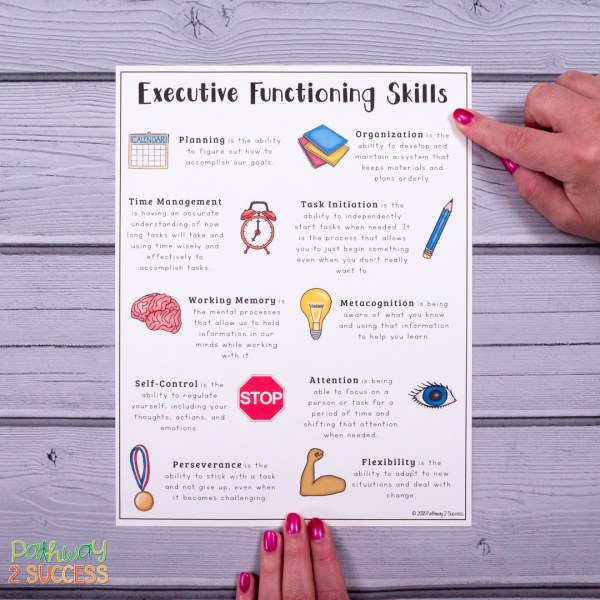
In many ways, strong executive functioning skills are the foundation for success. These are the mental processes that help learners plan through assignments, organize materials, initiate a task, manage time well, stay focused, try new strategies when stuck, and persevere until the completion of a goal. If you think about it, those skills are important for every single thing we do! They are also integrated into every content and curriculum area that we teach. If we want our students to be better planners, organizers, and flexible thinkers, we need to invest the time in teaching executive functioning skills.
The best part about teaching these skills is that all learners can benefit from improved executive functioning skills. Students can always learn better strategies for planning, organizing, managing time, paying attention, and problem-solving to work through challenges. Of course, it shouldn’t go without saying that some students need these skills more critically than others. Whether you are teaching these skills as an extra support or a necessary intervention, it is always worth the time.
Here are over 15 ways you can teach executive functioning skills:
#1 Teach skills explicitly.
Plan an executive functioning and study skills block to teach skills explicitly. Depending on what time you have available, you can choose to teach these skills for 20 minutes per day or just once a week. As an educator, I know it’s challenging to find more time in the day. Some possibilities that might work include during a lunch group, resource room, morning meeting, advisory periods, or just once a week at the start of your class to start the week off strong. Even though finding the time can be difficult, it is always worth the investment. If you aren’t sure where to start, check out this yearlong executive functioning set of lessons and activities. By learning skills for planning, organization, time management, attention, and more, students will have more strategies necessary to succeed in school and beyond.

#2 Engage in class discussions.
As a group, openly talk about each of the skills and ask questions to get students really thinking. You can always come up with conversation starters on your own. One of my favorite ways to do this, though, is using these Executive Functioning Task Cards. They are already broken up into 10 executive functioning skills. You can just read the card and give time for students to discuss in small groups or as a full class. Some examples of questions might be: “Choose any class. If you had a test in that class, what 3 pages from your notebook would study from? (this focuses on organization)” or “You have a lot of homework and you have practice at 6pm. What can you do?” (this focuses on planning). The whole idea is to get learners thinking and activating their brains for each of the skills. And of course, kids often learn best from each other so discussion is always a great option!
#3 Play board games.
Games are a fun, interactive, and motivating way to practice executive functioning skills. The key is to be purposeful about highlight and teaching the skills as you play. For example, one of my favorite games is Pictionary. By playing, kids can work on a number of skills: They have to plan what they will draw, manage their time as the timer goes down, and be flexible and change their strategy when others aren’t guessing correctly. Read this blog post for more ideas about using games to strengthen executive functioning skills.
#4 Integrate it with curriculum.
Executive functioning skills are in everything we do. It only makes sense to teach and discuss them in everything, too. If you are starting a long-term project, take a little extra time to teach about planning. Help students understand that they should map out exactly what they want to accomplish before they start. During independent work time, discuss strategies for time management and using time well. Before a test or quiz, explain about metacognition and thinking about what you know in order to help learners study what they really need to. The opportunities for integrating EF skills into the curriculum are truly endless.

#5 Read literature and stories.
Literature can be used to discuss and highlight a number of skills. Again, the key is to be purposeful and directed about discussing and teaching those skills. You might ask how a character planned for a certain event, why they used self-control, or how they used perseverance to work through a challenge. There are so many wonderful short stories and picture books that help highlight some of these skills. I’ve also developed an entire set of Executive Functioning Stories that explicitly highlight the skills. Of course, you can highlight many of these skills is almost any story you choose!
#6 Highlight skills throughout the day.
Just like with academic content, students need to hear EF terms and phrases over and over again. One simple way to help kids learn about executive functioning skills is just to talk about them and highlight them on a regular basis. Remind them when they are using self-control to stop and think before answering a question. Encourage a student who organizes their binder during downtime in class. These small reminders can go a long way!

#7 Use an interactive notebook.
Interactive notebooks can be a great tool to teach skills in a fun and hands-on way. I developed a complete executive functioning interactive notebook to teach about all EF skills: everything from planning and organization to self-control and flexibility. If you haven’t used an interactive notebook before, the idea is really simple. Kids follow the directions to cut out items and put them in their notebooks. They have to read passages, answer questions, and complete tasks along the way. Kids learn critical skills in a hands-on way while creating a permanent notebook as evidence of their learning.
#8 Use crafts.
Using crafts can be highly motivating! For many learners, art can be a window into learning skills that are otherwise very challenging for them. One of my favorite crafts is making Executive Functioning Keys. The whole idea is to teach kids about the skills while they put together their own set of “keys to their success”. As you give each student a key to cut out and put on a ring, discuss the skill and explain why it is important. Best of all, learners can keep these keys as a reminder of the skills they’ve learned about.
#9 Watch videos.
There are many free videos for kids and young adults that teach about executive functioning skills. One set of videos called “Adventures of You” highlights EF skills in a very kid-friendly way. These would make for a fun advisory or morning meeting discussion!
#10 Develop and reflect on goals.
Developing goals with students can be extremely beneficial. This activity can be done during morning meeting, an advisory period, or an end-of-the-week reflection time. By creating goals and monitoring the progress on a regular basis, students can start to become more self-reflective. They should think about what worked, why they saw an improvement (or why they didn’t), and what strategies they can implement going forward.
#11 Play activities and other games.
It’s helpful to have a “toolbox” of quick activities for highlighting and practicing EF skills. Simple activities like Freeze, Simon Says, Musical Chairs, and Guard Duty are great when you have just a few minutes left of class and want to use it in a positive way. Head over to this blog post to read more about practicing executive functioning skills with play activities.
#12 Use role play.
Bring up real-life scenarios involving executive functioning skills and have students act out the situation with partners. For example, you might say: You were out sick for two days and you have no idea what the homework was. What might you do? Students act out solving the problem, such as going and asking the teacher, looking up assignments online, calling a friend, or asking a classmate face-to-face. Role-play is one of my favorite techniques because it’s fun for the kids and they will remember the skills they act out!
#13 Give mini-lessons on one skill per week (or month).
If you want to integrate EF skills into the day, plan to teach one skill per week or month. Do whichever works best for you. My favorite order of teaching these skills is: Planning, Organization, Time Management, Task Initiation, Working Memory, Metacognition, Self-Control, Attention, Flexibility, and Perseverance. Start by discussing the skill, explaining what it means and what it looks like, give reasons why it’s important, and strategies to help learners improve the skill. Then, continue to highlight and discuss that skill consistently throughout the week or month. Use this free executive functioning poster to help you discuss each skill.
#14 Use visual cues and reminders.
Use posters or a bulletin board to visually remind learners about the skills. You can even have your students create class visuals with directions on what it means to pay attention, manage your time, and get organized! Refer back to the visuals to discuss and highlight these skills throughout the week. For students in need, you can even give them specialized visuals reminding about specific skills right on their binders or desks.
#15 Use escape rooms.
An escape room activity is a little bit of work to set up, but worth all the effort! I created a few sets of executive functioning escape rooms to target these skills in an interactive way. Students work together in teams to solve puzzles. Each puzzle requires them to learn about and use executive functioning skills. After completing all puzzles, students will get access to a secret phrase to “escape” the room. Try this free executive functioning escape room to get started or read up more about how to build escape rooms in your classroom!
#16 Use brainteasers and brain games.
Start the day with a brainteaser or riddle to get kids thinking! Not only are kids exercising their brains, but these are fun activities that help set a positive tone for the day. One thing I loved doing in my middle school classroom was sharing a riddle and not giving the answer until the end of the day to encourage kids to think on their own and develop perseverance! Brainteasers and brain games can be so much fun.
While all learners can benefit from learning about executive functioning skills, some students are going to need executive functioning interventions and supports a lot more than others. For more information, read up on my blog series about executive functioning interventions and supports.
















Fantastic aids to use.
Thanks so much! I hope they are helpful!